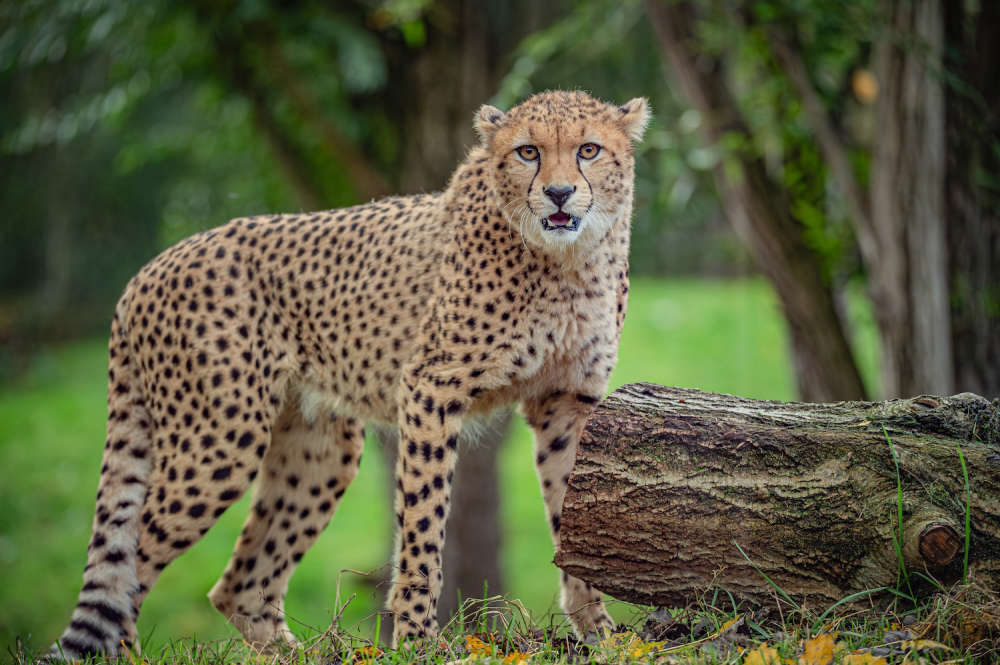A rare Malagasy fossa has arrived at Chester Zoo as part of a special international breeding programme – and now he’s getting ready for his big first date with his new mate.
Seven-year-old Zaza has travelled to England from San Diego Zoo in the USA on an important mission to help protect his species from extinction, having been identified as an excellent genetic match for Chester’s resident female, Shala.
Conservationists hope the pair will go on to make a vital contribution to the continued survival of the species by having pups.
The fossa, which is native to Madagascar, is a highly threatened species with fewer than 2,500 estimated to remain in the wild, largely due to mass deforestation.
Mark Brayshaw, Head of Mammals at Chester Zoo said:
“Zaza is part of a global conservation breeding programme. With the fossa listed as vulnerable to extinction by the International Union for the Conservation of Nature (IUCN), and its wild habitats in Madagascar under threat from rapid development, Zaza’s move to Chester Zoo is an important part of the international effort to ensure this wonderful and unique species is safeguarded long into the future. We’re very pleased to see him arrive.”
The fossa is the largest natural predator in Madagascar where they hunt for prey such as lemurs, birds, lizards and mice. Although they have retractable claws like cats, they are most closely related to mongooses.
Fossas naturally live solitary lives and, to ensure this is replicated at the zoo, Zaza and Shala will live apart most of the time, only coming together for breeding.
Keeper Jack Cunningham, a member of the Carnivore team at Chester Zoo, said:
“Initially we plan to rotate the two of them separately around different parts of their habitat so they can smell each other. They can see each other through a glass window and there’s also a screen we can slide open between their dens which allows them to see each other, without being able to get to one another straight away. It’s all part of our slow and gradual introduction process.”
The sliding screen might make this seem a bit like an episode of Blind Date, but the fossas must be properly introduced at precisely the right moment.
Jack added:
“Female fossa only come into season once a year for a two-week period.
“They’re usually a silent species, except for when the females are looking for males, and then they will vocalise. After a few days of soft introductions through the windows and mesh, we’ll know Shala is ready to meet Zaza because she will stand at the top of a tree and scream, which is her way of saying: I’m ready!
“She was a wonderful mum to her first pups, so we’re excited to see if she and Zaza have their own litter.”
Shala, who arrived in Chester in 2018, had a litter of pups with her previous mate, Isalo, who will be moving on from Chester as part of the same breeding programme. Their pups have already found new homes in the UK and on the other side of the Atlantic.
As well as contributing to the continued survival of the species, Shala has also contributed to scientific knowledge of the species.
Her mating call has been recorded and analysed to create a spectrogram (a visual representation of sound). This allows researchers in the rainforests of Madagascar to identify when female fossas are looking for mates in the wild, which helps track species numbers and identify which environments are best for them.
Lucy Pearson and Candice Dymek were Zaza’s keepers at San Diego Zoo.
Lucy said:
“Zaza is a very energetic and well-tempered fossa and can be very vocal when excited. He was the bravest of the four pups in his litter due to his curious personality.”
Candice added: “While it is hard to say goodbye to this lovable fossa, we are excited at the potential for him to sire pups and grow the European fossa population, and to be a part of such a large collaboration that will continue to further conservation efforts in Madagascar.”
Conservationist from Chester Zoo, working alongside partners in Madagascar, have been protecting habitats on the island for more than 15 years.
Fossa facts:
- Fossa and other Madagascan carnivores have evolved separately to animals in mainland Africa for roughly 20 million years. That’s why they are unique! Their ancestors may have drifted to Madagascar on a natural raft.
- In the wild, male fossas gather to compete to reach a female waiting in a ‘mating tree’. This kind of competition is uncommon in mammals and is more often seen in birds, where males scuffle and display during a ‘lek’.
- Female fossas bulk up before meeting prospective mates, putting on muscle, particularly around their necks and jaws. They also vigorously scent-mark their territories, which can lead to them rubbing the fur from their necks.
- It can be difficult to tell the difference between juvenile male and female fossas as female fossa genitals begin to resemble that of males. They will change again later in life. Scientists theorise this allows females to compete for territory or stops young males bothering them until they are in season. If Shala has more offspring, they may help zoo scientists find ways to reliably tell the sex of fossas using different techniques, including chromosome testing.
- Fossa pups are born blind and weigh about 100g (about the same as a small apple). They first leave their den between four to five months old, and by a year old are independent from their mother.
- As well as habitat shrinkage, fossas are at risk from dogs and cats introduced to Madagascar. They may come into conflict with these relatively newly introduced predators and can catch diseases from them.
- About half of a fossa’s diet in the wild is made up of lemurs. The rest might include tenrecs (a hedgehog-like creature), small lizards and birds. The fossas at Chester Zoo are given a varied diet which includes chicken, rabbit and beef.

 Blues Match Report: Scarborough Athletic 1 - 0 Chester FC
Blues Match Report: Scarborough Athletic 1 - 0 Chester FC
 Blues Match Preview: Scarborough Athletic v Chester FC
Blues Match Preview: Scarborough Athletic v Chester FC
 The Cheshire Police and Crime Commissioner has saved ten PCSOs
The Cheshire Police and Crime Commissioner has saved ten PCSOs
 Illegal vapes, tobacco and alcohol seized in trading standards operation
Illegal vapes, tobacco and alcohol seized in trading standards operation
 Man charged in relation to burglary in Chester
Man charged in relation to burglary in Chester
 Active travel and safety improvements coming to Ewloe roundabouts
Active travel and safety improvements coming to Ewloe roundabouts
 Aquanatal Classes Make Waves at Local Swim School
Aquanatal Classes Make Waves at Local Swim School
 CFC Women's Team Mid-Season Review
CFC Women's Team Mid-Season Review
 Chester and Wirral Football League - Weekend Round Up
Chester and Wirral Football League - Weekend Round Up
 Chester Zoo hits new all-time visitor record in landmark year for conservation charity
Chester Zoo hits new all-time visitor record in landmark year for conservation charity
 WILLY RUSSELL COMEDY SET TO BE STAGED AT CHESTER THEATRE
WILLY RUSSELL COMEDY SET TO BE STAGED AT CHESTER THEATRE
 Blues Match Report: Chester FC 0 - 1 Worksop Town
Blues Match Report: Chester FC 0 - 1 Worksop Town
 Blues Match Preview: Chester FC v Worksop Town
Blues Match Preview: Chester FC v Worksop Town
 Countess of Chester Hospital urges public vigilance and handwashing to help stop the spread of Norovirus
Countess of Chester Hospital urges public vigilance and handwashing to help stop the spread of Norovirus
 Cheshire Firefighter Recognised in New Year's Honours
Cheshire Firefighter Recognised in New Year's Honours
 Blues Match Report: Chester FC 2 - 0 Macclesfield FC
Blues Match Report: Chester FC 2 - 0 Macclesfield FC
Comments
Add a comment